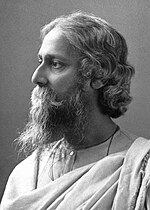Jana Gana Mana
"Jana Gana Mana" (/ˈdʒɑːnə ˈɡɑːnə ˈmɑːnə/; Bengali: জন গণ মন; Hindi: जन गण मन; lit. 'Thou Art the Ruler of the Minds of All People') is the national anthem of India. The original words were written in the Bengali language. It was originally a five-verse poem created in 1911 by Rabindranath Tagore—the same author for the Bangladeshi anthem.[1] In January 1950, just the first verse was made to be officially part of the national anthem of India per the Constituent Assembly of India.[2][3] In addition, the lyrics now contain many words of Sanskrit origin.[4]
| English: Thou Art the Ruler of the Minds of All People | |
|---|---|
 | |
National anthem of India | |
| Lyrics | Rabindranath Tagore |
| Music | Rabindranath Tagore |
| Adopted | 24 January 1950 |
| Audio sample | |
Instrumental version | |

Lyrics
change| Original words in Bengali | Official lyrics in Hindi | Official translation in English |
|---|---|---|
जन-गण-मन अधिनायक जय हे, |
Thou art the ruler of the minds of all people, |
- Transcriptions
The parenthesis mean that the vowel in them is not usually pronounced (sounded out) in regular speech, but is the case when singing, such as in this song. The title "Jana Gana Mana" is usually just pronounced as "Jan Gan Man"—the short a is pronounced like the a in the English word about. The ā (a with a line above it, or long a), on the other hand, shows that the a is pronounced like the a in the English word father.
| Pronunciation based on romanisation | Pronunciation of the Hindi words | Pronunciation of the Bengali words | Pronunciation of the English words with an Indian accent |
|---|---|---|---|
Jan(a) gaṇ(a) man(a) adhināyak(a) jay(a) hai, |
[dʒənə gəɳə mənə əd̪ʱinɑːjəkə dʒəjə ɦɛː] |
[dʒɔno ɡɔno mɔno od̪ʱinae̯ɔko dʒɔe̯o ɦe ǀ] |
[ˈd̪äʊ̯ äː(ɽ)ʈ d̪ə ˈruː.lə(ɾ) əʋ d̪ə ˈmäɪ̯ndz əʋ ɔːl ˈpiː.pəl ǀ] |
In state languages
change| Tamil translation | Marathi translation | Telugu translation | Odia translation |
|---|---|---|---|
சன கண மன அதிநாயக செய கே |
जनगणमन अधिनायक जय हे, भारतभाग्यविधाता. |
జనగణమన-అధినాయక జయ హే భారతభాగ్యవిధాతా! |
ଜନଗଣମନ-ଅଧିନାୟକ ଜୟ ହେ |
| Urdu translation | Malayalam translation | Punjabi translation | Sanskrit translation |
|---|---|---|---|
جنَ گنَ منَ ادھی نایکَ جَیَ ہے |
സർവ്വ ജനങ്ങളുടെയും മനസ്സിന്റെ അധിപനും |
ਜਾਨੋਗਾਨੋਮੋਨੋ-ਓਧਿਨਾਯੋਕੋ ਜਾਯਾ ਹੇ ਭਾਰੋਤੋਭਾਗ੍ਗੋਬਿਧਾਤਾ! |
जॉनोगॉनोमोनो-ओधिनायोको जॉयॉ हे भारोतोभाग्गोबिधाता! |
| Gujarati translation | Kannada translation |
|---|---|
જનગણમન-અધિનાયક જય હે ભારતભાગ્યવિધાતા! |
ಜನಗಣಮನ-ಅಧಿನಾಯಕ ಜಯ ಹೇ |
References
change- ↑ National Symbol: National Anthem. National Portal of India. Retrieved 10 April 2017.
- ↑ Britannica, Editors of Encyclopedia (2008), Britannica Encyclopedia of India (Set of 5 Volumes), Encyclopedia Britannica India, p. 167, ISBN 978-81-8131-008-8
- ↑ http://mha.gov.in/sites/upload_files/mha/files/pdf/NationalAnthem(E).pdf Archived 2018-04-18 at the Wayback Machine (dead)
- ↑ National anthem of India: a brief on 'Jana Gana Mana' (14 August 2012). News18.
- ↑ জনগণমন-অধিনায়ক. Tagoreweb.
- ↑ "Jana Gana Mana" full lyrics. nationalanthems.info. Kendall, David.
- ↑ भारत के राष्ट्रगान के संबंध में आदेश (Order relating to the national anthem of India). Ministry of Home Affairs. Government of India. 24 June 2018.
- ↑ The Complete Guide to National Symbols and Emblems [2 Volumes]. James Minahan. ABC-CLIO. p.61.